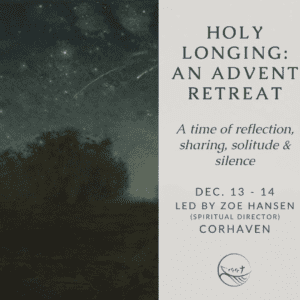“They were longing for a better country—a heavenly one.” – Hebrews 11
“After I became a Christian, I understood why I’ve always been homesick at home.” – G.K Chesterton, Orthodoxy
What child, no matter how virtuous they may be, after opening the last present under the tree doesn’t feel just a twinge of discontent, wondering, is that it? Or what adult laying down on the couch after Thanksgiving has left their belly overfull doesn’t still find in their soul a hunger?
As we enter this next season, I suggest, if we really want to enter into the spirit of Advent, we take some time to contemplate this hunger after the feast.
In my most recent article (Hospitality Among Sojourners) I wrote about how Hebrews 11 weaves this beautiful tapestry with the lives of our Hebrew heroes of our faith until, culminating in a revelation about the why behind what they did in verse 16, “they were longing for a better country—a heavenly one.”
It is in light of this longing for a better country that, if I was ever given the opportunity, I’d propose that we swap out the word joy as one of the traditional themes for Advent, and replace it with the German word sehnsucht. While I am not entirely sure that it would stick, I think it is worth making my case.
In his book, Surprised by Joy, C.S Lewis goes to great lengths to help his readers understand exactly what he means by the word joy:
“In a sense the central story of my life is about nothing else… that of an unsatisfied desire which is itself more desirable than any other satisfaction. I call it Joy.”
Contrast that definition with the standard Oxford Dictionary definition of the word:
Joy: A vivid emotion of pleasure arising from a sense of well-being or satisfaction.
For the world, what gives joy meaning is that we have been satisfied by what the world has delivered. But for Lewis, the very fact that children are never fully satisfied with a mountain of presents, or adults with the second helping of turkey, points to something yet to be discovered, something more than earthly pleasures.
“Creatures are not born with desires unless satisfaction for those desires exists. A baby feels hunger: well, there is such a thing as food. A duckling wants to swim: well, there is such a thing as water… If I find in myself a desire which no experience in this world can satisfy, the most probable explanation is that I was made for another world.”
And this brings me to my proposal that this year we replace the English word Joy, with the German word sehnsucht.
Sehnsucht might be best translated by stretching the English language just a bit by the phrase joyward longing. It is meant to convey a kind of joy that remains unsatisfied because it has not yet encountered the thing it knows it was truly created for. Lewis called this the inconsolable longing.
Perhaps Lewis’ most articulate example of Sehnsucht is found in his book, The Weight of Glory:
“The books or the music in which we thought the beauty was located will betray us if we trust in them; it was not in them, it only came through them, and what came through them was longing…For they are not the thing itself; they are only the scent of a flower we have not found, the echo of a tune we have not heard, news from a country we have never visited.”
We, like Jesus (Hebrews 12) have a joy set before us, and neither a mountain of Christmas presents under the tree or a mountain of home cooked food on the table will ever completely satisfy it. Not because these things are not good, but because their goodness remains incomplete until we cross into that better country for which we long.
 Advent invites us to embrace the ache after the gifts, the hunger after the feast. To welcome it as one more signpost pointing you to a better country.
Advent invites us to embrace the ache after the gifts, the hunger after the feast. To welcome it as one more signpost pointing you to a better country.
If setting aside some time to get in tune with the longings of Advent is something the spirit is perhaps stirring in you, then we’d love to invite you to join us at Corhaven on Dec 14th for our Holy Longing Advent Retreat.
Psalm 16 “You will show me the path of life; In Your presence is fullness of joy; At Your right hand are pleasures forevermore.”
